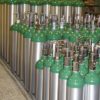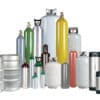This article, written by Agnes Baker with contributions by All Safe Global President & CEO, Matt Boettner, originally appeared in gasworld magazine in May of 2021.
Oxygen is critical to the care of Covid-19 patients. Getting medical oxygen to hospitals, EMTs, and home-bound patients is an important role in the industrial gas industry. As we hit the one year mark in the coronavirus pandemic, and infection spikes continue to pop up, gasworld checked in with US suppliers and distributors of medical oxygen to see how they were coping.
Long lead times
“The demand/supply for medical cylinders is just crazy now,” reported Rich Mansmann, Vice-President of Gas Programs for the Independent Welding Distributors Cooperative (IWDC), an organisation that leverages the strengths of its independent welding distributor members across North America.

Early in the pandemic IWDC worked with Air Products and IWDC member McKinney Welding Supply in New York setting up the temporary hospital facilities in Manhattan, Queens and Brooklyn. This exercise became a model for replication elsewhere.
Mansmann added, “The biggest problems we’re facing now in the medical oxygen market are excessively long lead times in obtaining cylinders, both steel and aluminium, and their associated valves. I don’t think cylinder manufacturers anticipated the rapid ramp up in demand we are experiencing now. There seems to be no end in sight.”
Supply chain issues
The industrial gas supply chain is complex and the pandemic has highlighted the interdependency of its distributors, suppliers and equipment/parts manufacturers.
With headquarters in Ohio, Evergreen Midwest provides the compressed gas and welding supplies industry with products from many of the US’ best manufacturers, including Catalina Cylinder, Metal Impact, Sherwood Valve LLC, and RegO.
As a supplier, Evergreen Midwest sits in the middle of the supply chain. According to company President Tom Cregan, demand for aluminium medical cylinders picked up dramatically at the start of the pandemic. Initially, Evergreen was able to meet customer demand but since the second surge in late 2020 and early 2021, the company’s lead times have gone way out.
“We have been quoted as long as 12-16 weeks for delivery on non-medical cylinders,” Cregan told gasworld.“Medical cylinders have been given manufacturing priority so lead times there are better at 8-10 weeks. Pre-pandemic lead times were 1-2 weeks.”
Long lead times have been caused by a spike in demand for cylinders and a lack of manufacturing capacity. Staff shortages caused by illness, Covid-related shutdowns and pandemic business protocols have made full production difficult to manage and are part of the problem. A shortage of manufacturing resources, like machines and raw materials, has also held up production.
Cregan reported the market for medical cylinders was beginning to stabilize last year but was overwhelmed by the unanticipated second surge of infections: “We went from a 1-3 week lead time for a medical E to an eight-week wait. We are fortunate that our medical cylinder suppliers are US-based. We have decent delivery times compared to other suppliers who import cylinders but we still have a lot of orders in the system right now.”
Valves are crucial to the operation of medical cylinders and have been in short supply as well. “Valves represent the biggest part of our business and right now anything made of ferrous or non-ferrous metals is delayed. Brass valves and fittings have had two price increases already this year,” Cregan said.
“Manufacturers cut back on their purchases of raw materials when business slowed during lockdown. No one could predict when demand would go up. When it did, at the beginning of the year, there were not enough goods in stock. Manufacturers had a hard time ramping up. Valve delivery has gone from a 1-2 week lead time to 8-16 weeks. We’re an added-service type company – we put the valves in the cylinders and ship them the same day. Not being able to get the product has been hard for us, particularly in the last month and a half. Fortunately, our customers have been very understanding. We keep them apprised of the situation and encourage them to place an order so they are in the queue.”
Business has slowed for Evergreen Midwest from this time last year.
“Our overall number is down, but coming back is doable,” reported Cregan. “We were down considerably at one point last year. Medical is usually not a big part of our business and the lockdown took a toll on our larger markets. Today, the size of our orders is lower, but the volume of orders is back up and that’s good to see.”
The shared solution
When Covid-19 cases spiked in El Paso, Texas in late 2020 and early 2021, Esteban Trejo, General Manager of independent gas distributor SYOXSA, saw the demand for medical oxygen cylinders increase three-fold.
“Our regular cylinder supplier was unable to meet our needs,” Trejo said.
“We were looking at lead times of two months for medical oxygen cylinders that clients needed right away. Fortunately, we were able to leverage our relationship with fellow IWDC member companies to source the urgently needed products. We purchased some cylinders from Mississippi Welders Supply and looked for used or refurbished cylinders in markets that were not being impacted by Covid. The IWDC made the coordination of that effort possible. Luckily, we never had a problem supplying related medical cylinder parts as we always keep a good inventory.”
Trejo continued, “When we were asked to help with setting up the temporary hospitals in El Paso, the IWDC was also instrumental in connecting us with Dan McKinney of McKinney Welding Supply. McKinney had been through this process in New York and guided me through operations here.”
SYOXSA’s fill plant, which has a 5,500 gallon medical oxygen capacity, had no trouble meeting fill demand but oxygen supply became an issue. Trejo explained, “Normally we pick up oxygen from a supplier north of us but that supplier could not meet our demand so we switched to another supplier. When that second supplier’s plant went down for maintenance, we had to go to Houston to get oxygen. Our drivers really pulled through for us and were able to meet our customers’ needs.”
Speaking in early April, Trejo said, “The market is still catching up on oxygen cylinder supply. We just received a big order that we placed a couple of months ago – 300 new medical E cylinders. This puts us in good shape moving forward.”
Prepared for the push in demand
WestAir Gases & Equipment, a large independent distributor of gases, gas equipment and welding supplies based in California, was at the epicenter of a Covid-19 surge late last year and into January of 2021. General Manager Andy Castiglione reported that despite ramped up demand for medical oxygen, the company was able to meet customer requests.
Like everyone else, WestAir was faced with the lack of availability of new cylinders to meet the spike in demand. Their solution was to refurbish. WestAir buys used cylinders from the government throughout the year and was able to use that stock to refurbish cylinders and put them into medical oxygen service. Castiglione said, “We have a large cylinder maintenance division so we did not need to add additional labour to get cylinders into rotation during the peak of demand. We were well prepared and never had to consider buying new cylinders.”
He added, “As medical oxygen providers sought to increase cylinder inventory levels, we saw several competitive accounts come over to us from the majors. As an independent distributor, we were able to provide better response times to hospitals with patients who could not afford to wait.”
Castiglione said today the situation is back to normal in his area for medical oxygen cylinder availability.
Refurbishers to the rescue
As WestAir’s story illustrates, cylinder refurbishers have been integral to solving the medical cylinder supply problem associated with regional pandemic surges. While cylinder refurbishing can take one to three days of processing time plus transport, depending on the service level required, that is far better than the current 8-10 week wait for a new cylinder.
All Safe Global is an industry-leading DOT cylinder requalifier, refurbisher, and wholesale distributor of equipment for the compressed gas industry with service centers in Minneapolis and Phoenix. Company chief executive Matt Boettner reported that “demand for refurbished medical cylinders, both aluminum and steel, and medical cylinder requalification are currently very strong. Our medical volume is 10x higher or more than in previous years.”
Boettner noted that while supply chains have been disrupted with capacity constraints and freight delays, “we have generally been able to keep up with demand by reallocating resources. We’ve had to be nimble about re-balancing our inventory.”
AirGenics, Inc., of New Jersey, is another leading US cylinder refurbisher serving the packaged gas industry and has dealt successfully with previous crises in medical oxygen supply including, 9/11 and Hurricane Sandy.
Company COO Jonathan Balbi said, “We were confident in our ability to handle spikes in demand but the initial impact of this pandemic challenged our abilities on every level including requalification, refurbishment, change of service, and retesting. We also were faced with extraordinary demands for 540 and 870 valves, in filling batch control, and in asset delivery. Due to the length of time it takes to train our employees, we did not have the luxury of adding extra staff to meet pandemic needs. My team and I simply made massive personal sacrifices to work 12 hour days, 6 days a week.”
At 25 cylinders per hour production, AirGenics is the only company which can handle large orders in the metropolitan New York area. Today, AirGenics is processing about 400 medical cylinders per week. At the peak it was 2,000 per week.
Interestingly, Balbi reported, “The total volume of cylinders processed in 2020 was roughly the same as the previous year. We hold pretty steady at 43,000 per year. The number difference was in sectors served. Entertainment saw a decline of 70% and Industrial and Welding decreased by 24%. The increase in our Medical business offset those losses.”
Looking ahead
The greatest challenges in meeting the spike in demand for medical cylinders centered on time and resource availability. Many of the people interviewed for this article shared Trejo’s sentiment: “What made this situation difficult was being on call 24 hours, 7 days a week but we were all committed to doing what we had to do. Everyone worked together.”
Pooling resources and being creative helped ease the resource availability problems. It also emphasized the importance of knowing everyone along the supply chain and keeping an eye on your stock. With Covid, “just-in-time” inventory has fallen out of favor.
WestAir’s experience reminds us that creative thinking and service are strengths to rely on in a crisis. Castiglione advised, “If we stay nimble we can help customers during severe times of need when others cannot.”
As for the future, the motto “Be Prepared” seems most apt. Mansmann of IWDC worries about panic buying that can extend lead times.
He advised, “If steel cylinder manufacturers/suppliers stay true to form, they’ll make large cylinders rather than small ones if given the choice. Distributors that need small cylinders should get those orders on the books and not buy large cylinders now unless they anticipate a critical need.”



